Javier García-Bernardo
University of Amsterdam
June 12th, 2019





computational social science and power

The CORPNET research group uncovers, investigates and aims to understand global networks of corporate power in contemporary global capitalism
What are we doing?
How?
- Using "big data" and bringing new methods from complex systems
- For the analysis of corporate ownership and corporate elites
PI: Eelke Heemskerk



starting point: relational understanding of power
Power: the capacity of actor A to make actor B do something that B would not otherwise do or as the exercise of such a capacity (Mark Haugaard).
-
Consciously (e.g. lobbying, agenda-setting) or unconsciously (e.g. ideology).
-
Direct (e.g. lobbying to the government), or indirect (e.g. lobbying to the unions, which then have power over the government).
-
All power is relational.
As such, we model actors as part of networks, and use methods from network science to analyze who is important in the network, and why.
what type of networks? (1) Corporate ownership

Nodes: Companies
Edges: Ownership relations
Nodes: Countries
Edges: Ownership relations

Vitali, Glattfelder and Battitson, PlosOne (2011)
Babic, Garcia-Bernardo and Heemskerk (forthcoming)
Typically directed networks
what type of networks? (2) Corporate elites
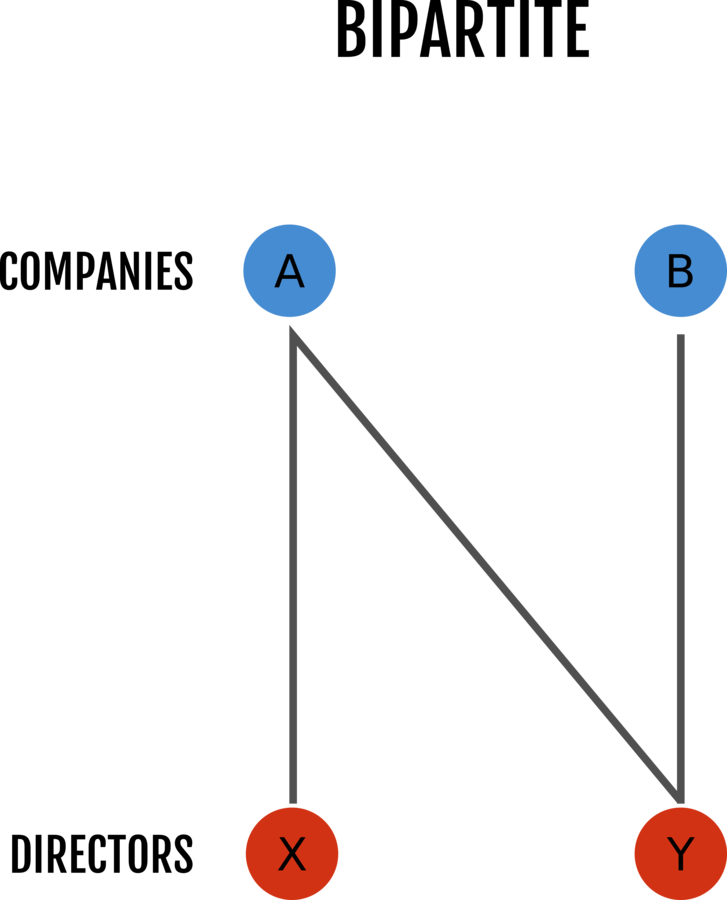
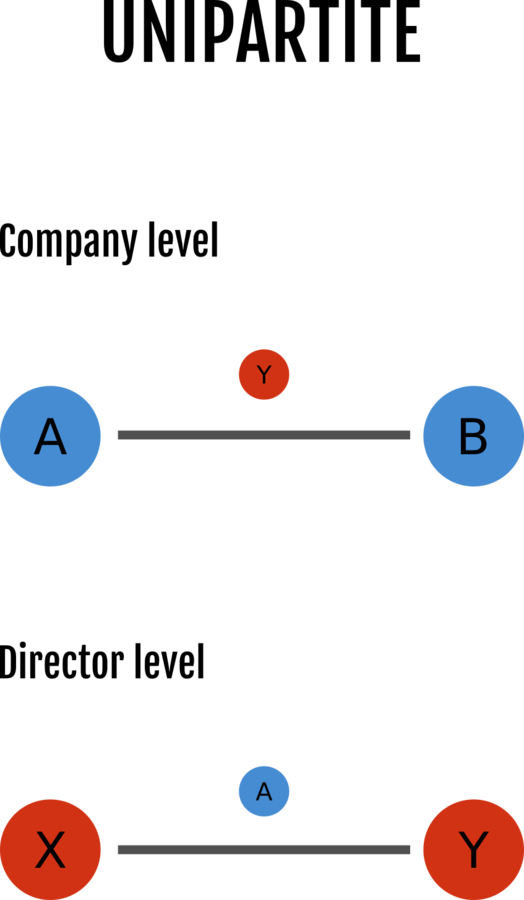


Edges: Shared board membership
Edges: Shared director
Typically undirected networks

Nodes: Countries
Edges: Move to a new country
what type of networks? (2) Corporate elites


structure of the talk
-
PART 1: methods and applications
-
PART 2: Data
part 1: methods and applications
method 1: network centrality
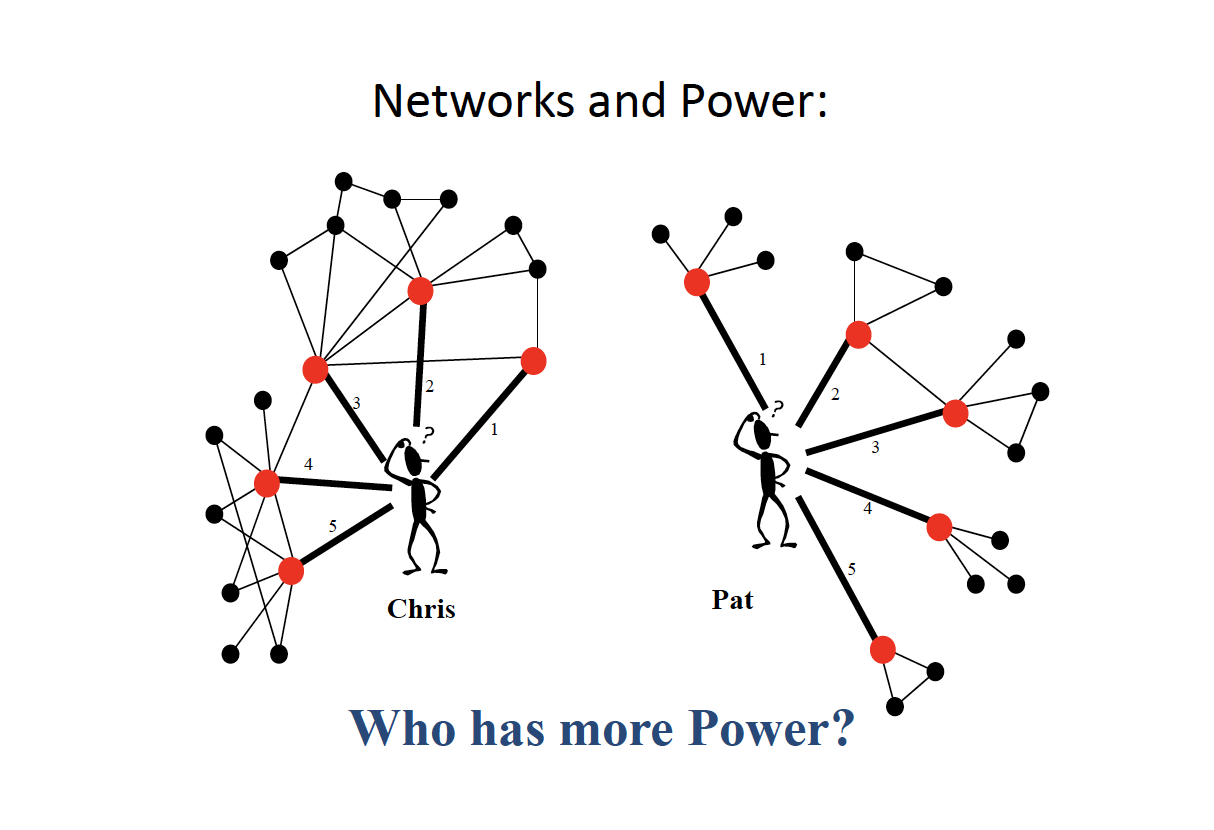
method 1: network centrality

Marriage network of families in Florence.
method 1: network centrality
Find the most powerful nodes in a network.
Main question: How do you define powerful?
-
The one with the most contacts [Degree centrality]
- Connect to many people directly
- Less dependent on other actors
-
The one able to influence most people [Eigenvector centrality]
- More visible: Acts as a `reference point'
-
The one able to broker social contacts [Betweeness centrality]
- Connect different actors, able to extract value from it




Endless definitions of centrality...
How to calculate centralities? General idea
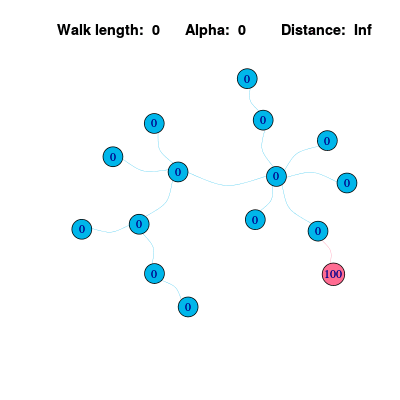
https://www.r-bloggers.com/from-random-walks-to-personalized-pagerank/
methods from complex systems (1): NEtwork centrality
Example undirected networks
- Degree
- Betweenness ~ How many times a node is in the middle of a random walk
- Eigenvector ~ How many random walkers are in a node
project 1: Big Three Passive Asset Managers
Jan fichtner & EELKE HEEMSKERK
@fichtner_jan

what's the network?
Nodes: Companies
Edges: Ownership relations
Since the financial crisis --> Three trillions transferred from active to passive funds (cheaper)

project 1: Big Three Passive Asset Managers
Passive managers buys all the stocks in an index. Do not try to beat the market.
- Do they have substantial voting power?
- Condition 1: One or few companies dominating the market
- Condition 2: Enough shares to make a difference
- Condition 3: Coordinate the voting of all funds
- Do they use it? --> Not yet: Fichtner, Heemskerk. SSRN (2018)
Usually, shareholders have three ways for exerting power/influence over companies: (1) Private engagements, (2) Voting, (3) Exit
- Large active asset managers in the early twenty-first century, such as Fidelity, preferred to sell their shares (easier). (Davis 2008)
- Passive investors have no option for (3) Exit, only options (1) and (2) are available. Regarding (2):
project 1: Big Three Passive Asset Managers
Do they have power? Condition 1: concentration
Three firms combined have >90% of the market


Node size proportional to eigenvector centrality.
Fichtner, J; Heemskerk, E M; Garcia-Bernardo, Business and Politics (2017)
Do they have power? Condition 2: voting rights

Do they have power? Condition 2: voting rights
A centralized voting strategy is a fundamental prerequisite to using their shareholder power effective
They coordinate!

Do they have power? Condition 3: coordination
Fichtner, J; Heemskerk, E M; Garcia-Bernardo, Business and Politics (2017)
project 2: the rise of transational state capital
milan babic
@mbabic_1

what's the network?
Nodes: Countries
Edges: Ownership relations
Babic, Fichtner, Heemskerk. The International Spectator (2017)
States not only regulate, enable and constrain corporate power; they are also actors in the global
economy as shareholders of corporations.

As owners of and investors in corporations, states use the transnational agency space to compete for returns on investments, thereby possibly creating (geo-)political ties.
This is not to say that state power is identical with corporate and class power; but states are 'juxtaposed' to those actors.
project 2: the rise of transational state capital
They have become important economic actors, playing juxtaposed to corporations
Babic, Heemskerk and Garcia-Bernardo (2019)

>100,000 investments
Node size:
Degree centrality

Babic, Heemskerk and Garcia-Bernardo (2019)
The transformation of state power (from regulators to actors) is not a one-way route

Clauset, Arbesman and Larremore. Science Advances (2015)
Morgan, Economou, Way and Clauset. EPJ Data Science (2018)

Ranking institutions
Transmission of information
Possible application: Understand the power of institutions, scientific journals, corporations
method 2: ranking
Community detection: which nodes form a cohesive group?

https://www.slideshare.net/ErikaFilleLegara/community-detection-with-networkx-59540229
method 3: community detection
project 3: structure of the interlock network
frank takes & EELKE HEEMSKERK
(Javier Garcia-Bernardo, Jouke Huijzer)
@franktakes


@JoukeHuijzer
what's the network?
Nodes: Cities
Edges: Board interlocks between companies in the two cities

Heemskerk, Takes, Garcia-Bernardo and Huijzer ‘ Sociologica (2016)
- Dominant approach when looking at interlocking directorates: National = local, transnational = nonlocal.
- In some regions the business communities are organized along national borders, in others at the city level
- Elites from Asia, Latin-America are not yet fully integrated in the corporate elite network that transcend local communities.
5 million firms

Clustering: what are similar sequences?




Power: How does the global elite comes to be? What are important institutions and pathways?
method 4: sequence analysis + clustering
project 4: emergence of the GLOBAL ELITE
diliara valeeva
@diliara_valeeva

what's the network?
Nodes: Countries
Edges: Directors' careers
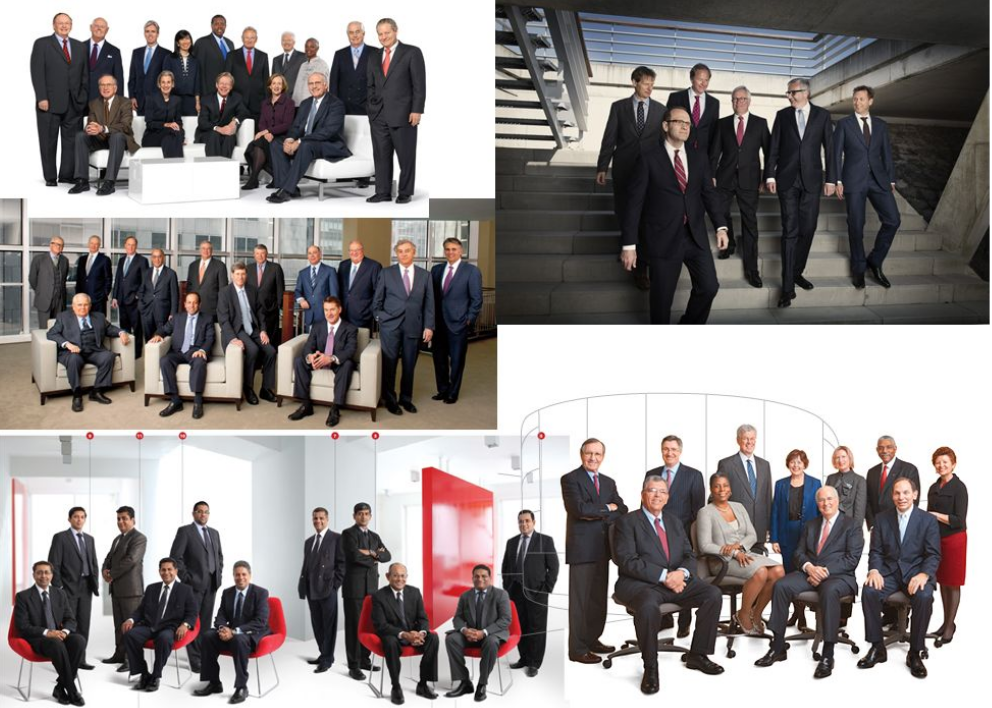
2017
Telstra Corporation Limited (AU)
Career sequence:
NZ
|
IT
|
US
|
CH
|
AU
|
US
1996-2007
Sun Microsystems (NZ)
2007-2016
Juniper Networks Inc (IT)
2014
Tesla (US)
2016-2017
ABB Ltd (CH)
Robyn Denholm, chair of the Tesla board since Nov 2018

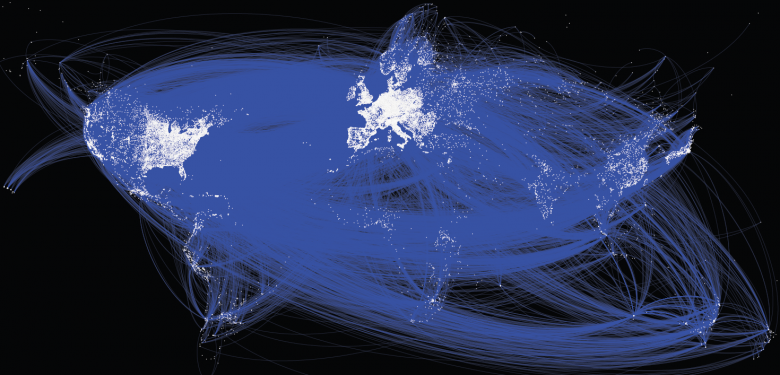
2018
Tesla (US)
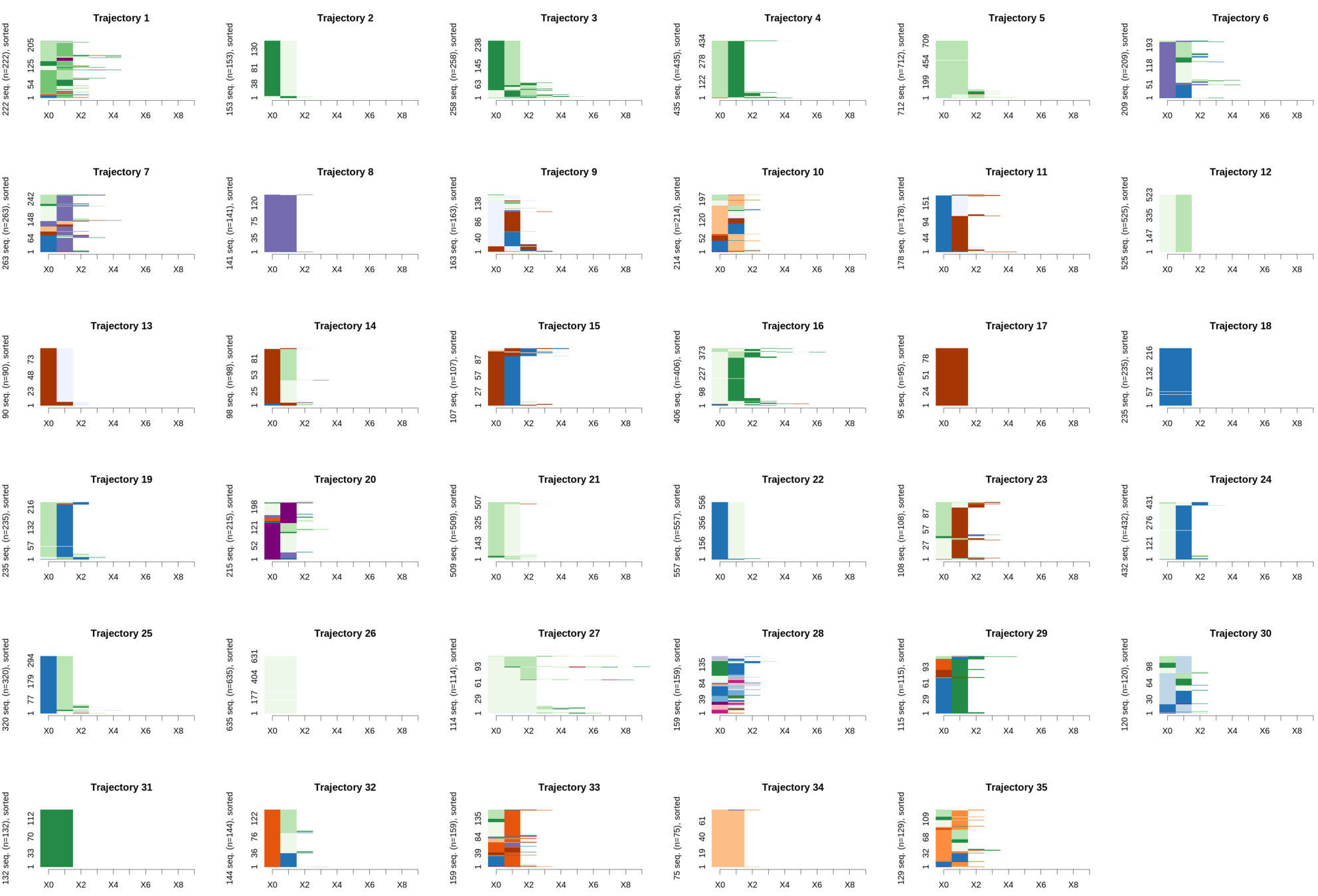
~10k largest companies and 10k executive
New insights:
- Understand flows of people, ideas, practices:
- There is a global labor market for executives.
- But it's highly hierarchical, directed, complex
- There is a core and periphery
- Competition between elites: There are different ways of integrating into the global power elites and each 'national elite' has their own way of doing so
- Emergence of new global centers: Asian elites interact with the Anglo-American world while trying to establish their own power elite, maybe alternative to the traditional and established ones.
project 5: tax avoidance and offshore finance
javier garcia-bernardo
@javiergb_com

who is the largest investor in germany?




who is the largest investor in brazil?




who is the largest investor in south africa?





why?
Tax avoidance
crash course in tax avoidance

Crash course on "tax avoidance" (base erosion / profit shifting)
Caveat: Arm-length principle: Intra-group payments need to be priced at "market prices"
However: What's the market price of a mermaid on a coffee cup?
- Step 1: Sell things in a country
- Step 2: Make intra-group payments to holdings in low-tax jurisdictions
- Intellectual property / brand / know-how
- Interest on loans
- Services/goods
- Bonus points if:
- Sign a secret APA with a government
- Take advantage of mismatches in tax treaties
drivers of tax avoidance
A: rising power of corporations




the great fragmentation of the firm
Reurink and Garcia-Bernardo (2018)
the great fragmentation of the firm
- 1980s:
- Switch to the shareholder value paradigm
- Reductions in trade and invest barriers
- Advances in Information and Communication technologies
- Firms began to unbundle:
- Operationally: Increase efficiency
- Legal-financial: Capture the value
- Intermediate holdings
- Rearrangement of intangibles
- Intra-group financing
- However:
- High withholding tax rates
- Multinationals were still mainly domestic

the great fragmentation of the firm
1990s:
- FDI started rising
- Double tax treaties and Investment treaties reduced withholding taxes
- Financialization of the firm: Financial profits started to have a higher weight
1) Increase the power of corporations over States: Ability to exit, and large size
Example: Shell
- British-Dutch oil and gas company headquartered in the Netherlands and incorporated in the United Kingdom.
B: Rising power of ofcs
the great fragmentation of the firm
1990s:
- FDI started rising
- Double tax treaties and Investment treaties reduced withholding taxes
- Intangibles started to have a higher weight
1) Increase the power of corporations over States: Ability to exit
2) Increased the power of some States:
- Attracting highly mobile parts of the firm
- Tax sovereignty
- BEPS
But which States?

Data provider: Orbis
~300 million companies
~100 million ownership links
sink-OFFshore financial centers


15 companies per capita
Garcia-Bernardo, Fichtner, Takes, Heemskerk (2017)













conduit-OFFshore financial centers







Garcia-Bernardo, Fichtner, Takes, Heemskerk (2017)

Garcia-Bernardo, Janský and Tørsløv (forthcoming)
main Reason
Small countries (OFCs) have large incentives and little restrictions to give de facto advantages to multinational corporations
That reduces the autonomy of other countries (especially in the EU) on taxation, and force them to decrease corporate tax rates.




Blocking EU legislation
rising power of offshore financial centers
Low tax rates for interests and intellectual property
c: rising power of the professionals

@lajdacic
Lena Ajdacic
Talk at 12:30!
D: rising power of wealth
Source: World Inequality Database


Wealthy people have access to better investments and lower taxation
part 2: data
Computational methods allow you to find new approaches to answer questions of power
classification
Supervised machine learning
- Training data: Give titles with labels (important position / not important)
- Prediction: Give unlabeled titles
Mr Charles Ko - Quantitative Research Analyst, Global Quantitative Equity
Mr Colin D. Meadows - Senior Managing Director and Chief Administrative Officer
name matching
Database 1
- Mr. John Smith
- John Smith
- John Smith
- John Smith
Database 2
- John Smith
- Jonh Smith
- John Smit
- Jon Smit
Now do it with 100 million names, you have
10,000,000,000,000,000 possible pairs
data scraping

We collected a set of 8.6 million votes on 2.7 million unique proposals at AGMs worldwide. These votes are cast through 3,545 funds that are part of a set of 131 Asset Managers.
project 6: mapping tax professionals
SAILA Stausholm & javier garcia-bernardo
@thesailaway_CPH


Data: LinkedIn ads
Computational social science gives new methods useful for the understanding of power
- Network centrality: Importance of actors in networks
- Community detection: Cohesion, belonging
- Sequence analysis/Clustering: Similar individuals, find common trajectories
- Sequence analysis/Markov chains: Find brokers
Also new opportunities to automatize work:
- Classification
- Name matching / Combine data
- Data scraping: https://github.com/jgarciab/web_scraping
corpnet.uva.nl

@javiergb_com
@uvaCORPNET

javiergb.com
corpnet@uva.nl
garcia@uva.nl
This presentation: slides.com/jgarciab/murten19